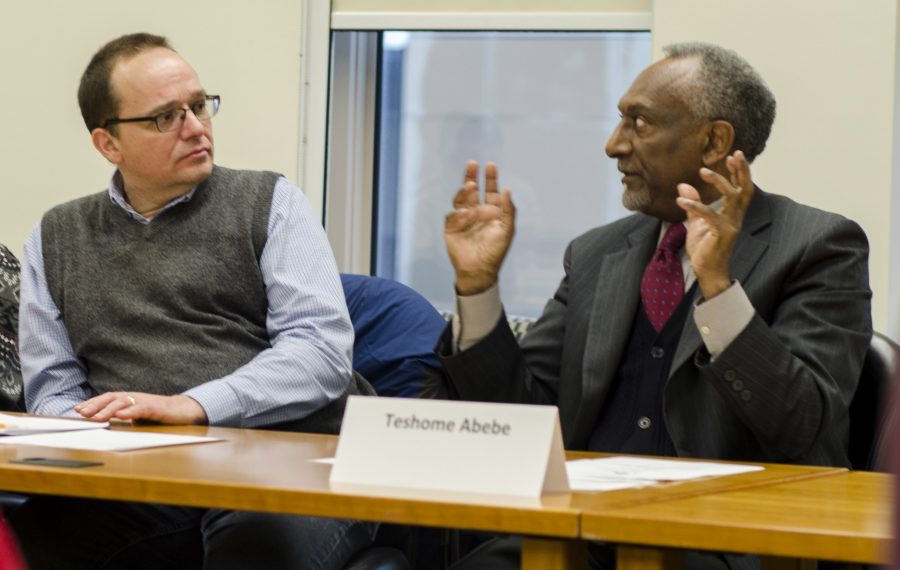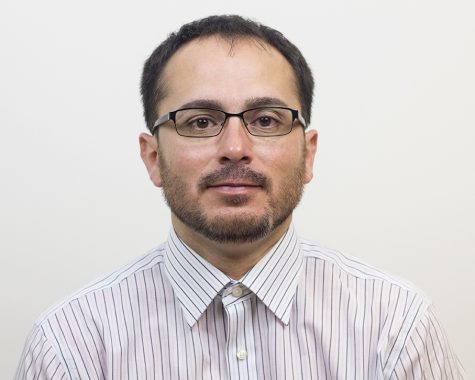Faculty Senate raises concerns about vitalization report
Music professor, Stefan Eckert (left) and Economics professor Teshome Abebe (right) discuss the recommendations made by Workgroups in the vitalization project that were posted on the project’s webpage Monday.
January 11, 2017
*Correction: C.C. Wharram was erroneously attributed. The News regrets the error.
In a special meeting to discuss the vitalization project, the Faculty Senate raised concerns about what it called “inconsistent information” in Workgroup No. 7’s final report.
During the meeting, members proposed a referendum asking faculty to vote on whether or not they believe Workgroup No. 7’s report is an accurate and trustworthy source of information for Eastern President Glassman to base his decisions on.
They decided on this after the release of the vitalization project reports on Monday.
It is difficult to figure out how to proceed in an orderly fashion, Senate Chair Jemmie Robertson said.
Faculty Senate member Teshome Abebe said it does not even seem like they read the responses and suggestions from the different departments. He said it was especially frustrating that five formerly first-choice programs were relabeled as third-choice programs, without ever explaining why or what criteria determined this. The shared governance policy is not working in this instance, Abebe said.
“Both institutional planning and direction are at cross purposes sometimes,” Abebe said.
Faculty Senate member Stefan Eckert agreed and said the Workgroup reports still had discrepancies throughout them that were brought up as a concern when the drafts were originally released.
“It leaves me flabbergasted,” Eckert said. “This report seems to say, ‘this program is essential, let’s cut it.’”
Eckert said he was also upset to see the open process the faculty was promised in this matter turn into a fight for survival for some programs through a “divide and conquer” type process.
Another problem with the Workgroup’s findings was the criteria which they were to judge the academic programs by, Faculty Senate member Ellen Corrigan said. Whether or not something is central to the mission is not a good criterion because through the mission all academics are central she said.
Faculty Senator Charles Wharram also expressed concern about the fact that department reports did not seem to have been read by Workgroup No. 7.
“Notes made are in red and are few and far in between,” Wharram said. “They are generally verbatim taken from the drafts. We don’t know if our reports were even read or not and that is disheartening. No one is aware if their program is being considered for deletion.”
Faculty Senate member Grant Sterling said that with the deadline coming up so quickly, it is unfair to expect any department that may be receiving such important news to form and present an appropriate response and defense to the committee.
“This is not an intelligent response to the question, ‘What can we do to save money?’” Sterling said. “The recommendations don’t bear any source of logical reaction to losing money, like the suggestions to cut the philosophy and pre-engineering departments. They got it wrong by every standard. Part of the problem is it’s hard to see what the recommendations are supposed to mean.”
Sterling said that as far as the philosophy department was concerned, one member of Workgroup No. 7 seemed to recommend getting rid of the department completely, while another recommended merging the department with the history department, and a third member recommended leaving the department as it is.
Faculty Senate member Billy Hung said that the university should look at the situation that went on in Wisconsin universities and Western Illinois University as a canary in the mine of sorts. In both situations major academic programs were eliminated along with professors without much if any revenue increase. Although, he said, it goes much further than money.
“Financial strain becomes a pretext to eliminating the academic freedom at universities,” Hung said. “Putting certain professors and departments under the heat lamp prevents them from teaching more controversial classes to keep their department open.”
Provost Blair Lord said all the reports filed by the faculty were given to the Workgroups; however, he could not confirm whether or not the Workgroups reviewed all the reports before making their reports public.
“Much of this is imposed on us and the situation we’re operating under is simply ghastly,” Lord said. “I don’t think anyone is doing the devil’s work here, and that’s what makes it so hard.”
Chrissy Miller can be reached at 581-2812 or clmiller9@eiu.edu.

















![[Thumbnail Edition] Senior Foward Macy McGlone, getsw the ball and gets the point during the first half of the game aginst Western Illinois University,, Eastern Illinois University Lost to Western Illinois University Thursday March 6 20205, 78-75 EIU lost making it the end of their season](https://www.dailyeasternnews.com/wp-content/uploads/2025/03/WBB_OVC_03_O-1-e1743361637111-1200x614.jpg)




















































